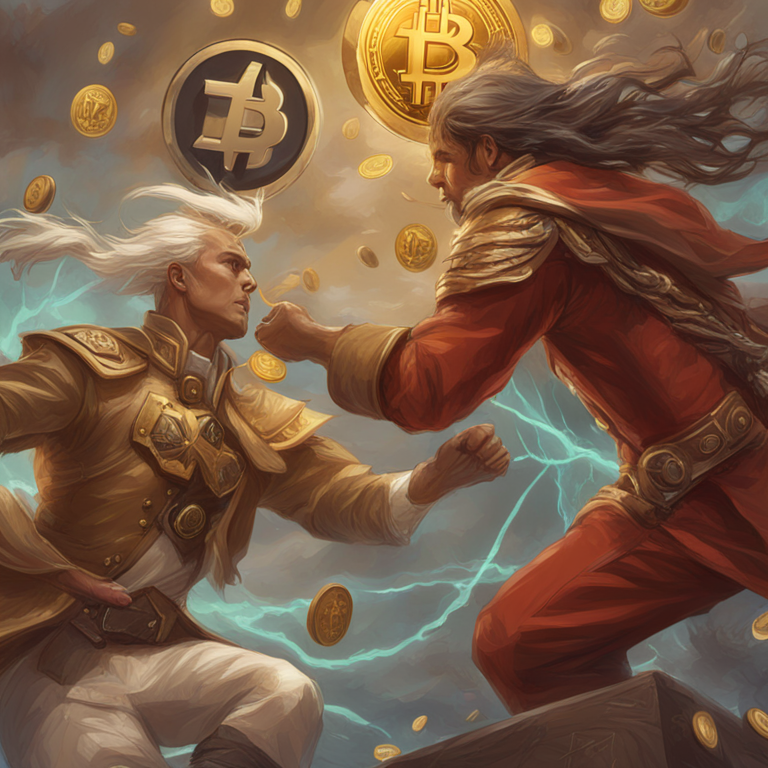Ethereum Co-Founder Joe Lubin: US Crypto Hostility Goes Beyond Biden, Gensler
- byAdmin
- 14 May, 2024
- 20 Mins

Introduction
Is it just me, or does it feel like the universe is conspiring against your crypto investments these days? Well, you’re not alone. The crypto community is buzzing with tension, and Ethereum co-founder Joe Lubin has just added more spice to the mix. In an exclusive chat with Decrypt, Lubin shared his thoughts on why the U.S. seems so hostile towards the crypto industry. And, spoiler alert, he thinks it goes way beyond President Biden or crypto’s favorite person to dislike, Gary Gensler. According to Lubin, the hostility could be the work of a powerful entity, possibly related to the banking lobby, that feels threatened by the disruptive potential of decentralized finance (DeFi). But that’s not all—there’s a lot more drama unfolding behind the scenes. Intrigued? Let’s dive in!

Background
Alright, let’s set the stage. Picture this: In recent months, anger and frustration at the U.S. government’s chilly attitude towards crypto have been practically palpable. Many in the industry have been quick to point fingers at prominent Democrats such as President Joe Biden, Senator Elizabeth Warren, and SEC Chair Gary Gensler. It’s almost like a blame game on repeat, with everyone trying to figure out who the main culprit is. Yet, enter Joe Lubin stage left, offering a fresh perspective that makes this whole situation sound like the plot of a political thriller.
Lubin’s notion is not about individual personalities wreaking havoc but rather a broader, secretive force—maybe even something linked to the banking lobby—that feels existentially threatened by crypto and DeFi. Just in case you’re thinking, “Hey, this sounds like one of those conspiracy theories,” it’s worth noting that Lubin’s idea has roots in a concept known in the crypto-industrial complex as “Operation Choke Point 2.0.” This theory, popularized by Castle Island Ventures partner Nic Carter, suggests that there could be a calculated effort at the federal—perhaps even international—level to throw roadblocks in the way of crypto businesses. Sounds intense, right? Well, sit tight.
The phrase “Operation Choke Point 2.0” harks back to a real initiative dubbed “Operation Choke Point,” which the Department of Justice ran from 2013 to 2017. The original operation sought to unlawfully sever ties between payday lenders, firearms dealers, and banking services, making life pretty darn difficult for them. There’s speculation that a similar operation is being aimed at the crypto industry now. Lubin hints that the storyline this time might be even bigger, driven by America’s passion for maintaining world dominance, particularly through financial intermediaries.
In Lubin’s eyes, this represents a likely clash of civilizations: the battle between decentralization enthusiasts and the well-entrenched American establishment. This perspective makes it easier to understand why the SEC’s harsh stance on crypto isn’t exactly a shocker. In fact, Lubin’s own company, Consensys, has recently filed a preemptive lawsuit against the SEC to challenge the notion that buying and selling ETH is tantamount to illegal, unregistered securities trading. And here’s a zinger: Lubin previously mentioned that an SEC win could “spell the end of the Ethereum blockchain in the United States.” How’s that for a plot twist?
But hold on, there’s a twist in Lubin’s own tale. While he does think some unseen Wall Street force might be at play, he throws in a couple of caveats. For starters, this is just speculation, folks—not hard evidence. And secondly, it’s not like the traditional finance world is completely against blockchain tech; most major banks are quite cozy with Bitcoin ETFs, with more lining up to list Ethereum ETFs. However, Lubin argues that profiting off crypto ETFs doesn’t equate to real support for decentralization. Wall Street could easily fatten its pockets with Bitcoin ETFs while doing everything in its power to stymie firms like Consensys from building a decentralized utopia.
So, what’s the takeaway here? According to Lubin, traditional finance players might still do well as they ride the crypto wave, but they certainly wouldn’t mind perpetuating the existing system for as long as humanly possible. Now, doesn’t that add a spark to the ongoing crypto debate?

Lubin's perspective
In recent months, if you toss a crypto coin in the U.S., it’ll probably land on someone griping about the government’s increasing hostility towards digital currencies. It’s become a trend to blame various Democrats, including President Biden, Senator Elizabeth Warren, and the ever-popular Securities and Exchange Commission Chair Gary Gensler.
But hold on to your crypto wallets, folks, because Ethereum co-founder Joe Lubin has a different spin on this narrative. According to Lubin, this predicament isn't about personal vendettas or partisan politics. There might be a bigger fish to fry here. “It might go beyond that,” Lubin stated in an exclusive interview with Decrypt. He hinted that an unseen entity, potentially connected to the banking lobby, could be pulling the strings behind the scenes.
Why would the banking lobby care so much about crypto, you ask? Lubin suggests that the decentralized dream could be a nightmare for traditional finance, and by extension, the global influence wielded by the American state. In other words, powerful forces might be resisting crypto not because of who’s currently in office, but to protect long-term American dominance.
Blame beyond Biden and Gensler
Lubin’s comments are a refreshing—and somewhat alarming—departure from the finger-pointing game we’ve seen lately. Could the whole "crypto crackdown" be systemic rather than symptomatic? He suggests that it might not just be President Biden, Senator Warren, or Gary Gensler having a bad day. Instead, there could be deeper-rooted motivations at play.
He raises a valid concern that America’s financial system operates in a top-down manner, intent on maintaining control. Crypto, by design, threatens this very structure since it pushes for decentralization and democratization of financial services. For Lubin, the bitterness isn't just because the U.S. leaders woke up on the wrong side of the bed; it’s brewed from an age-old tussle between maintaining control and surrendering it.
One might even say it’s a story as old as time, or at least as old as finance itself. Control the money, control the world, right? And crypto—decentralized, borderless, and innovative—shifts this paradigm, making traditional financial gatekeepers pretty anxious.

The banking lobby theory
The plot thickens as Lubin introduces the idea that these cryptic (pun intended) anti-crypto movements might be connected to a powerful banking lobby. Imagine a bunch of bankers, clad in dark suits and ominous ties, scheming in a dimly lit room, and you’re halfway there. According to Lubin, it’s not outlandish to consider that traditional finance insiders might see crypto as a systemic threat worth neutralizing.
His claim isn’t entirely a stab in the dark. The global financial system is historically conservative and protective of its proven methods. They clawed their way to the top of the finance food chain, and they’re not about to let a bunch of decentralized rebels shake their throne.
One might argue it’s like in those mafia movies where the old guard faces off against the new, plucky upstarts. And, as Lubin notes, this isn't just a domestic affair. The ramifications of a shift towards decentralization could ripple through global financial markets, making this a high-stakes game indeed.
Operation Choke Point 2.0
Sounding eerily like a Hollywood sequel, “Operation Choke Point 2.0” is a term gaining traction among some in the crypto industry. If Castle Island Ventures partner Nic Carter’s theory holds water, then we could be looking at a coordinated federal effort to throttle the lifelines of crypto businesses.
This theory borrows its name and inspiration from the real “Operation Choke Point,” which saw the Department of Justice attempt to cut off certain businesses from banking services from 2013 to 2017. This time around, the targets could be innovative blockchain companies, with federal agencies allegedly acting like overzealous referees in the wild game of crypto.
As Lubin puts it, what’s happening might actually be “bigger than even that.” If true, then the U.S. government alongside traditional financial behemoths could be playing a high-stakes game to maintain their upper hand. It paints a picture not just of resistance, but possibly of an orchestrated effort to keep the status quo unchallenged.
Implications for the crypto industry
Clash of civilizations
Describing the clash between decentralization advocates and traditional finance as a “clash of civilizations” might sound like something out of a dramatic epic, but Lubin is serious. This ideological showdown has always been simmering, he says. The current anti-crypto sentiment from entities like the SEC is merely a surge in this ongoing tide.
Lubin sees decentralization as more than just a financial model—it’s almost a cultural shift. Crypto enthusiasts envision a world where economic power is distributed rather than concentrated, and that’s a paradigm shift the old guard isn’t ready to accept. Hence, this confrontation was perhaps always inevitable.
It’s modernization versus tradition, innovation versus regulation, and decentralization versus control. The stakes? The financial future of, well, everyone. And in Lubin's view, rather than a specific person or party, it’s this gigantic, collective resistance from traditional powers that’s manifesting the hostility against crypto.
Consensys lawsuit against the SEC
Adding even more spice to the plot, Consensys, the Ethereum software fortress Lubin founded, recently went to legal war with the SEC. They filed a preemptive lawsuit challenging the regulator's stance that buying and selling ETH amounts to an illegal, unregistered securities offering.
Lubin has gone on record stating that an SEC victory in this case could spell the end of Ethereum in the United States, essentially booting out one of the country’s most influential blockchain entities. (Full disclosure: Consensys is also one of the 22 investors in Decrypt.)
This lawsuit isn’t just a legal squabble—it represents a broader battle for crypto’s legitimacy in the financial landscape. Lubin contends that while traditional financial giants can still profit off Bitcoin ETFs, they’ve hardly committed to true decentralization. The underlying fear is that while Wall Street might embrace blockchain technology just enough to make a quick buck, they’re simultaneously playing the long game to suppress other disruptive blockchain innovations.
“All of them can do well on this technology. That doesn’t mean they don’t want to perpetuate the system for as long as they can,” Lubin said. In other words, traditional finance might be hedging its bets, profiting off crypto market movements while quietly lobbying to stunt its revolutionary growth.

Traditional finance and crypto
When you think about the epic showdown of the century, your mind might drift to colossal movie battles or intense sports rivalries. But if you’ve been paying attention, there’s a real-world duel happening right now between traditional finance (commonly tucked under the cozy comforter labeled ‘Wall Street’) and the new kid on the block: cryptocurrency. At its core, this isn't just a fight about money but a clash of entire economic philosophies. Imagine it as Wall Street donning a monocle, peering down at a scrappy startup version of itself that’s no longer a fan of wearing ties.
The Ethereum co-founder, Joe Lubin, believes that the US crypto hostility extends beyond prominent political figures like Biden and Gensler. He speculates that an overarching entity, possibly linked to the banking lobby, might be behind the resistance to decentralization. If Lubin's theory holds water, it would mean that this isn't just a matter of political squabbling but a deeper strategic defense of age-old power dynamics. It's like Wall Street is gripping its pearl necklace, aghast at the notion of letting those darn, meddling decentralists crash the party.
Wall Street’s involvement

So, what's the deal with Wall Street's involvement in the crypto sphere? It’s a bit of a love-hate relationship, quite like that of a cat and a laser pointer. On one hand, Wall Street sees the lucrative potential of cryptocurrencies – the way someone might look at a piñata, gleaming with the promise of delicious, candy profits. We see massive banks embracing Bitcoin ETFs like a bear hug from a stingy uncle who just found out you’re wealthy. This move isn't surprising, given Wall Street's knack for sniffing out financial gains like a truffle pig hunting for gourmet fungi.
However, Joe Lubin would argue that these actions don't necessarily signal an endorsement of the foundational principles of cryptocurrencies – namely decentralization. Here, Wall Street's game plan resembles that of a sports team playing defense: it’ll scoop up points (profits) where it can while simultaneously working to undermine the competition’s offensive strategy. Hedging their bets on Bitcoin might look great on quarterly reports, but it’s a far cry from getting dancey with the true decentralized spirit of the crypto movement.
Profiting but fighting decentralization
Here's the kicker – while major financial institutions are making the most of the crypto phenomenon via ETFs and other tools, they’re playing a double game. Lubin suggests that while Wall Street firms engage in these activities to fluff up their bottom lines, there's also a desire to stave off a truly decentralized future that could disrupt their control. It's like being friends with someone because they make a great party guest, but you secretly hope they never challenge you to karaoke lest they steal your spotlight.
The explicit resistance to companies like Consensys and other proponents of a decentralized financial future demonstrates Wall Street's instinct to maintain the status quo. They might tolerate Bitcoin and Ethereum on the fringes, but allowing such innovation to seep too deeply into the financial fabric could erode the long-standing advantages they cherish. It’s the corporate equivalent of keeping your enemies closer, but never, ever letting them into the executive lounge.
Conclusion
In summary, the complicated dance between traditional finance and crypto is a high-stakes one, replete with intrigue, power plays, and more than a few clandestine moves. Joe Lubin's speculations push us to consider that the resistance crypto faces may be a calculated effort by entrenched financial interests, more than mere political theatre. Whether Wall Street’s guarded coziness with crypto will evolve into something more genuine remains to be seen. What’s certain, though, is that this isn’t just a financial feud; it’s an ideological contest with the potential to redefine our economic landscape forever. Who knew economics could be this thrilling? Now if only they’d make a blockbuster movie out of it...
Ethan Taylor
Ethan Taylor here, your trusted Financial Analyst at NexTokenNews. With over a decade of experience in the financial markets and a keen focus on cryptocurrency, I'm here to bring clarity to the complex dynamics of crypto investments.



